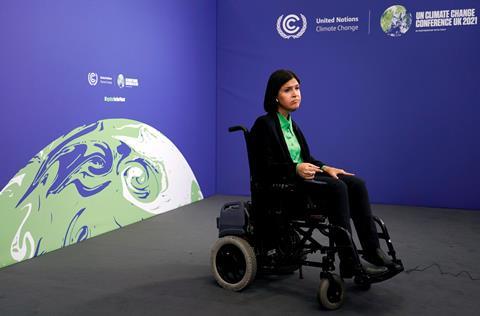The failure to provide an accessible entrance for Israeli minister Karine Elharrar at COP26 has been roundly condemned. But Lucy Khoneizer, who is mother to a wheelchair using son, wonders if we’re actually all guilty of making similar mistakes

On Monday the Israeli Energy Minister was left waiting outside of COP26 Climate Summit for two hours because she simply couldn’t get in.
Why couldn’t she get in? Because she was in a wheelchair.
You may be left wondering, how is it possible that this can happen in the UK in 2021? But sadly, this situation is not uncommon. And it should cause all of us to reflect and ask questions of ourselves.
When I read what happened to Karine Elharrar a little part of me died inside. As the mother of a wheelchair using child, I was struck by how Elharrar was a victim, not of her disability, but of someone else’s incompetence.
While the UK’s Environment Secretary, George Eustice, apologised to the Israeli politician, he appeared to blame her delegation for not providing information about her ‘particular’ needs. But why do these ‘particular’ needs still have to be communicated? Surely every access point should have automatically been accessible, considering the 30,000 expected attendees were coming from a global population of which 15 per cent are people with disabilities?
The story has caused many to reflect on important questions: Why is it that in 2021 accessibility is still not part of the master plan and is still an afterthought? And why is a woman, sitting in a wheelchair, left to sit outside for two hours and the problem still not sorted out until the next day? As Alison Kerry from Scope said, “it is inexcusable”.
As Christians it can be all too easy for us to point the finger at the organisers of an expensive conference in Glasgow and declare, “not good enough”, but the simple truth is we’re in no position to cast the first stone. So rather than throw poison arrow comments at the organisers, we should use this story to reflect on our own attitudes and our own places of work and places of worship. When we do that, we’ll discover we’re hardly in a position to judge.
Do we truly have an inclusive mindset or is the ramp at the front or (as is usually the case) at the side or back of the building, our token gesture to inclusivity? What does this say about how we value the minds of those unable to use stairs?
When I think of Elharrar and my son, I’m aware of how much narrower our discussions, decisions and future plans will be if they are not able to ‘get in’, to get involved, if their potential input is not valued enough to factor inclusivity into our mindsets and physical spaces.
Let’s talk to people with disabilities to find out what changes need to happen in our churches and workplaces, to make sure everyone feels equally valued and included, just as God created us to be. Because if we cannot plan inclusivity into a Climate Summit to hear what the experts have to say, then how on earth are we going to save the planet?


































